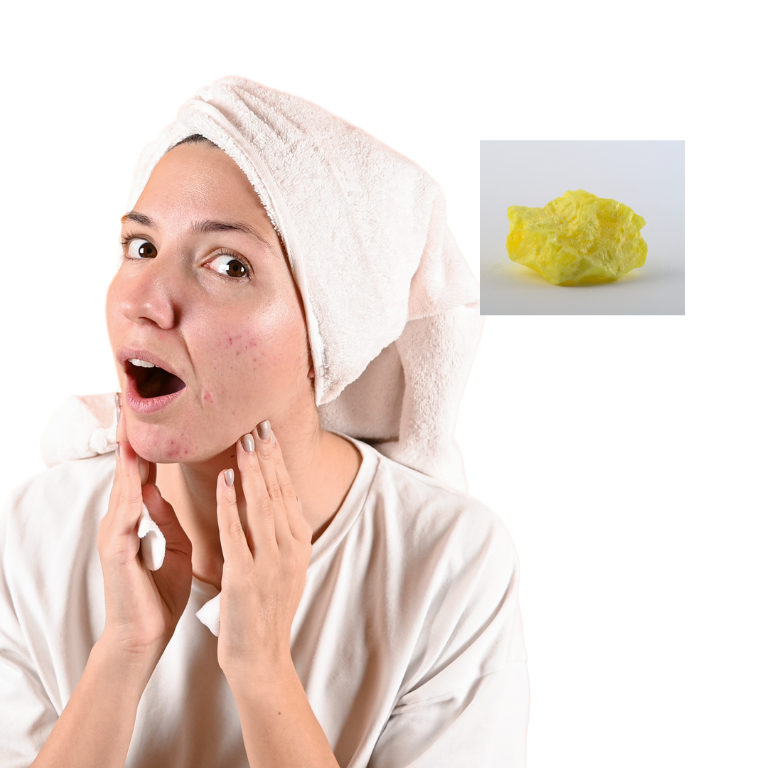
SULPHUR – The infamous miracle for your skin health!
What is Sulphur?
Sulfur (also spelled “sulfur”) is a chemical element with the symbol S and atomic number 16. It is a nonmetal, abundant in nature, and occurs in many minerals, especially sulfates, and sulfides.
Sulfur is essential for life, playing a role in the production of proteins, vitamins, and enzymes. It is also used in the production of fertilizers, gunpowder, dyes, and rubber.

Sulfur is found in many places in nature and is abundant on Earth. It is one of the most common elements in the Earth’s crust and can be found in minerals such as sulfates and sulfides. Sulfur is also found in underground deposits, often near oil and gas reserves, and can be mined for commercial use.
In addition, Sulfur is a component of volcanic gases released into the atmosphere through volcanic activity. Sulfur is also found in many natural hot springs, where it can be obtained through the process of evaporating the water.
Sulfur has been used for a variety of purposes for thousands of years. In ancient times, Sulfur was used in the production of black gunpowder and as a medicine to treat skin conditions and various illnesses.
Sulfur was also used as a component of many traditional cosmetic preparations, including skin ointments, baths, and soaps.
Throughout history, Sulfur has been mined and extracted from natural sources such as volcanic and hot springs. It has been used for its medicinal and cosmetic properties.
The characteristic Odor of Sulphur!
Sulfur has a characteristic odor that is often described as a strong, pungent smell similar to rotten eggs. This odor is due to the presence of hydrogen sulfide. This chemical compound is commonly produced by bacteria in decaying organic matter. The smell of Sulfur is easily recognizable and often used as a marker for the presence of sulfur-containing compounds.
Is Sulphur present in our bodies?
Sulfur is the third most important mineral in the body; the other two are calcium and phosphorous.

It is a component of many essential biomolecules, including amino acids, which are the building blocks of proteins, and sulfated carbohydrates, which play crucial roles in cellular signaling and other processes.
Sulfur is also a component of vitamins B1 and B7 and is involved in the production of insulin and other hormones.
In addition, Sulfur is present in various compounds that help to maintain the health of joints, skin, hair, and nails.
Sulfur plays a role in cellular detoxification processes that can impact DNA health.
While Sulfur is not considered a nutrient that needs to be consumed in large amounts, it is still an essential element for human health and well-being.
It helps maintain skin elasticity, and sulfur bonds help muscles, skin, and bones maintain their shape. A sulfur deficiency can lead to several health issues.
Sulfur is vital for skin health for several reasons
Sulfur is commonly used in skincare products, especially for acne treatment. By absorbing excess oil and unclogging pores, it helps to reduce the buildup of dead skin cells, oil, and bacteria that can contribute to the formation of pimples and other types of acne. Additionally, Sulfur has mild antiseptic properties, which can help to further reduce the risk of infection in the pores.
Sulphur’s most common skin uses are:
- Acne treatment: Sulfur has been used as a treatment for acne for many years. It is thought to help unclog pores and reduce inflammation.
- Keratin production: Sulfur is a component of keratin, a protein that makes up a significant portion of the skin, hair, and nails. Sulfur helps to keep the skin and hair healthy by promoting keratin production.
- Antioxidant properties: Sulfur has antioxidant properties that can help to protect the skin from damage caused by free radicals.
- Moisturization: Sulfur helps to keep the skin moisturized by attracting water molecules and keeping them in the skin.
Overall, Sulfur is an essential element for skin health and plays a role in maintaining its overall health, appearance, and function.

It can be found in various skincare products, such as creams, lotions, and masks. It can also be obtained through the diet by consuming foods rich in Sulfur, such as eggs, garlic, onions, and cruciferous vegetables.
How to get Sulphur to your skin?
There are several ways to get Sulfur for your skin:
- Skincare products: You can find Sulfur in various skincare products, such as facial creams, masks, and spot treatments, that are formulated specifically to address skin concerns such as acne, oiliness, and dryness.
- Dietary sources: Sulfur can also be obtained by consuming foods rich in Sulfur, such as eggs, garlic, onions, and cruciferous vegetables.
- Supplements: Sulfur can also be taken in supplement form, either as a standalone supplement or as part of a multivitamin or mineral supplement.
- Homeopathic Sulfur- Sulfur is one of the top prescribed remedies by homeopaths for skin issues & to maintain skin health.
It’s important to speak with a healthcare professional before using any new skincare products or supplements to ensure they are safe and appropriate for you.
Are sulfur springs good for the skin?
Sulfur springs, also known as hot springs or thermal springs, contain water naturally rich in Sulfur, a mineral known to have therapeutic and cosmetic benefits for the skin.

Some people believe that soaking in sulfur springs can help to improve skin conditions, such as acne, eczema, and psoriasis, and promote overall skin health and appearance.
The warm, mineral-rich water in sulfur springs is thought to help to soften and hydrate the skin, remove dead skin cells, and unclog pores. Additionally, the Sulfur in the water is believed to have antibacterial and anti-inflammatory properties, which may help reduce redness, swelling, and other skin conditions.
While soaking in sulfur springs may benefit some people, speaking with a healthcare professional before trying this treatment is essential, especially if you have a skin condition or any other medical concerns. Additionally, it is always a good idea to be mindful of the temperature and duration of your soak and to protect your skin from the sun and other environmental factors.
What are the best food sources of Sulphur?
Sulfur is an essential mineral that is found in a variety of foods. Some of the most common sulfur-rich foods include:
- Meat, poultry, and fish: These foods are high in protein and contain significant amounts of sulfur-containing amino acids, such as methionine and cysteine.
- Cruciferous vegetables: Vegetables such as broccoli, cauliflower, kale, and cabbage are rich in Sulfur and contain other essential nutrients, such as vitamins and antioxidants.
- Garlic and onions: These pungent foods are rich in Sulfur and commonly used to flavor various dishes.
- Nuts and seeds: Nuts and seeds, such as almonds, pumpkin seeds, and Brazil nuts, are high in Sulfur and a good source of healthy fats, fiber, and other nutrients.
- Eggs: Eggs are a good source of Sulfur, protein, healthy fats, and other vital nutrients.
- Whole grains: Whole grains, such as brown rice and whole wheat, are a good source of Sulfur and other essential nutrients, such as fiber and B vitamins.

Eating a varied and balanced diet that includes a variety of sulfur-rich foods is essential to ensure that you get adequate amounts of this crucial mineral. Additionally, it is always a good idea to be mindful of your diet’s overall quality and limit your intake of processed and high-fat foods.
Should you take Sulphur supplements?
The effectiveness of sulfur supplements as a treatment for various health conditions is a matter of scientific debate, and there is limited evidence to support their use.
Sulfur is an essential element that is required by the body in small amounts for various biological processes, including protein synthesis and the production of collagen and other vital substances.
In normal amounts, Sulfur is considered safe for most people.
Is it possible to overdose on Sulphur?
It is possible to overdose on Sulfur, although this is generally not a common occurrence.
Sulfur is an essential element and is required by the body in small amounts for various biological processes.
In normal amounts, Sulfur is considered safe for most people. However, consuming excessive amounts of Sulfur can lead to an overdose, which can cause various symptoms, including diarrhea, nausea, vomiting, headache, and dizziness.
It is important to follow recommended serving sizes for any sulfur-containing supplements and to consult a healthcare professional before taking any new supplements to ensure that they are safe and appropriate for you. Additionally, it is always a good idea to be mindful of the sulfur content in the foods you eat and to avoid consuming large amounts of sulfur-rich foods.
Deficiencies in Sulfur are relatively rare in developed countries. Sulfur is found in many foods and is considered an essential mineral required by the body in small amounts for various biological processes.
However, some individuals with skin issues may have low levels of Sulfur in their diet, which could contribute to certain skin conditions.
For example, researchers have suggested that Sulfur may play a role in maintaining healthy skin and that low levels of Sulfur in the diet could lead to skin issues such as acne, eczema, and psoriasis.
Additionally, some studies have suggested that sulfur supplements help to improve skin health by reducing inflammation and promoting the production of healthy skin cells.
However, more research should be funded to determine the relationship between Sulfur and skin health.
It is always a good idea to speak with a healthcare professional before taking any new supplements to ensure they are safe and appropriate for you. Additionally, it is essential to consider other factors that could contribute to skin issues, such as stress, poor diet, hormonal imbalances, and genetics.
To conclude, Sulphur is an incredible element for our health, especially skin health.
I recommend consuming all the sulfur-rich foods; however, I only recommend the supplements if you get approval from your GP.
Homeopathic Sulphur also works very well for skin issues.

I myself prescribe homeopathic Sulphur to many of my patients but remember, as homeopathy works on the principles of nanoparticles, it is way different from conventional medicine; therefore, everyone doesn’t accept homeopathy – & that’s fine.
So, in short, homeopathic Sulphur, 30 c is a safe potency; however, as I always say – please don’t self-prescribe homeopathy – talk to a qualified & experienced homeopath.
I hope you liked this blog; remember to like, subscribe & share!
If you are dealing with a chronic skin issue and want to know how I can help you, feel free to email me.
I can assess your condition and provide a comprehensive holistic treatment plan, including any necessary herbal prescriptions, therapies, nutritional plan & lifestyle upgrades to heal your skin from inside out!
